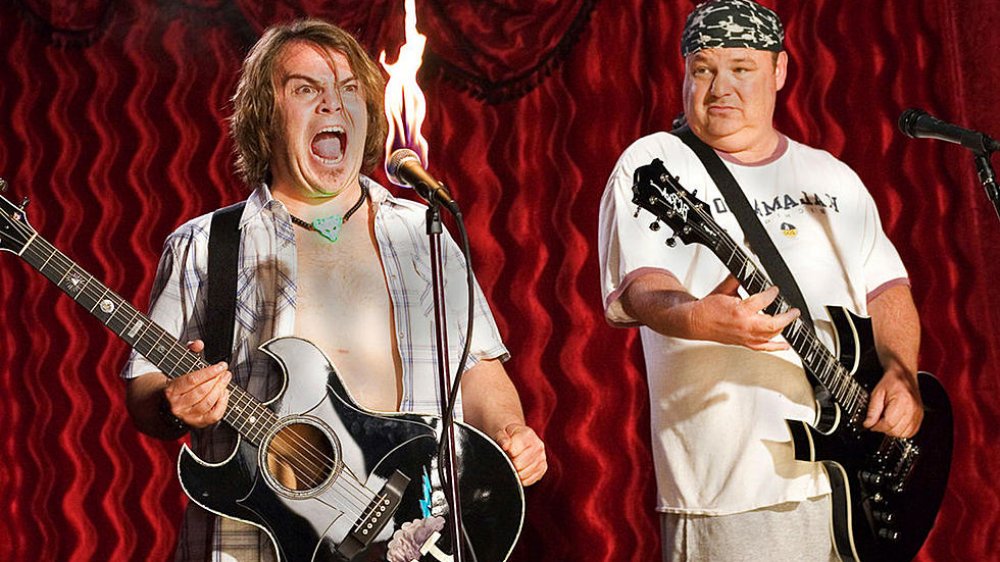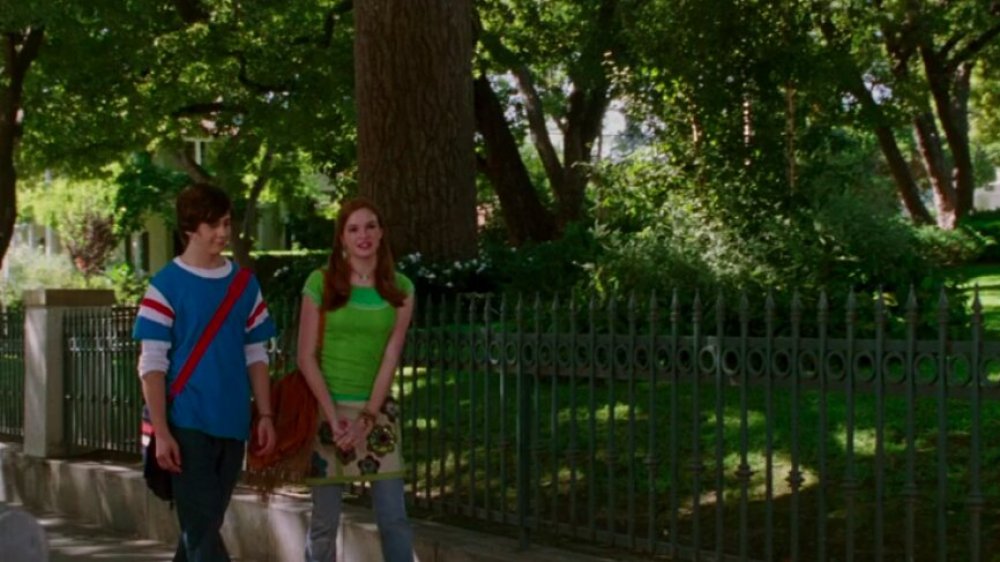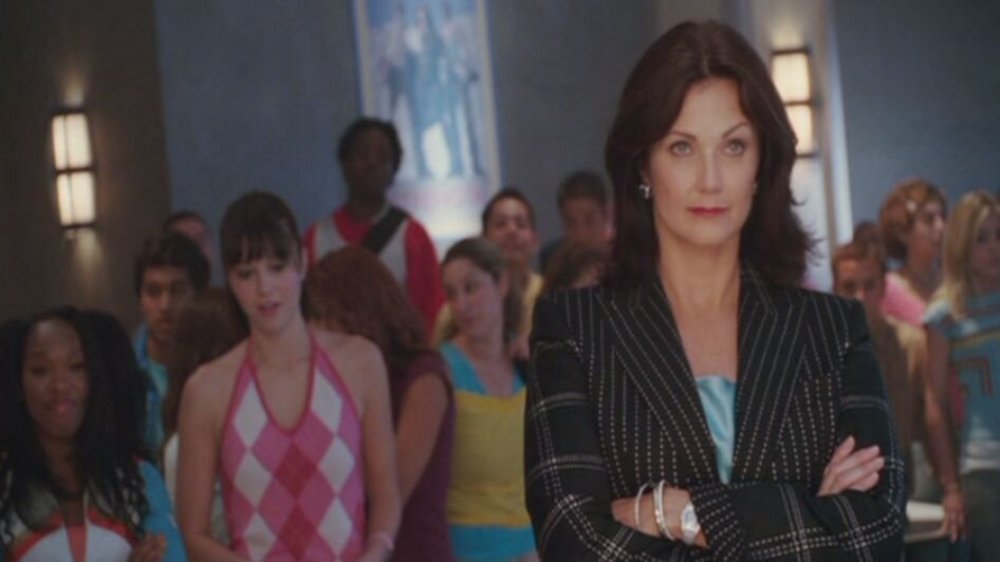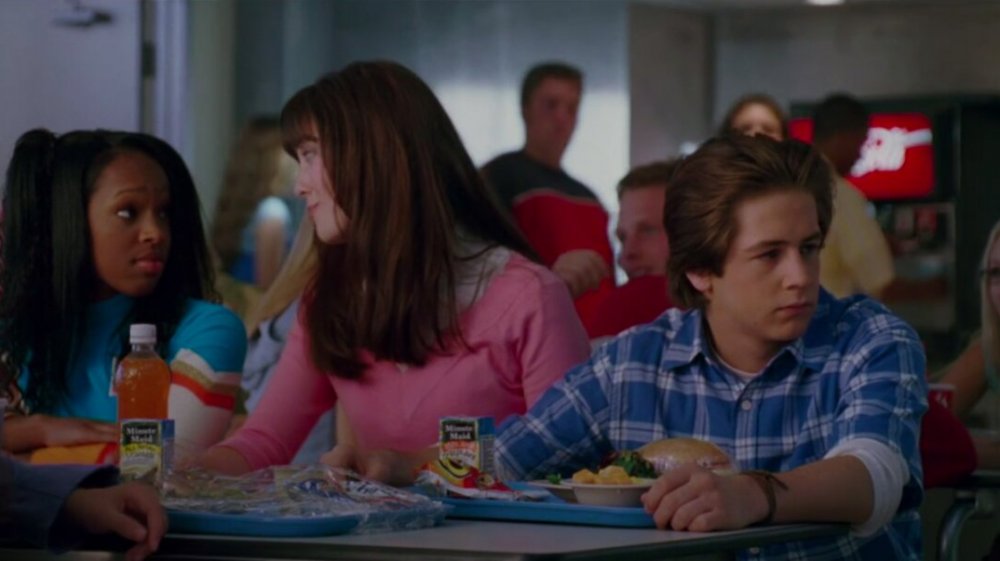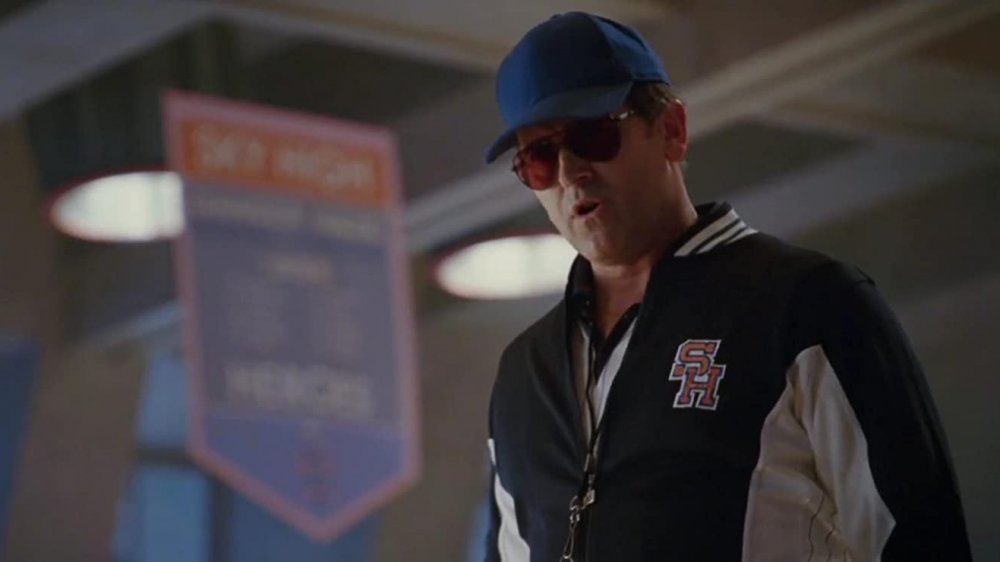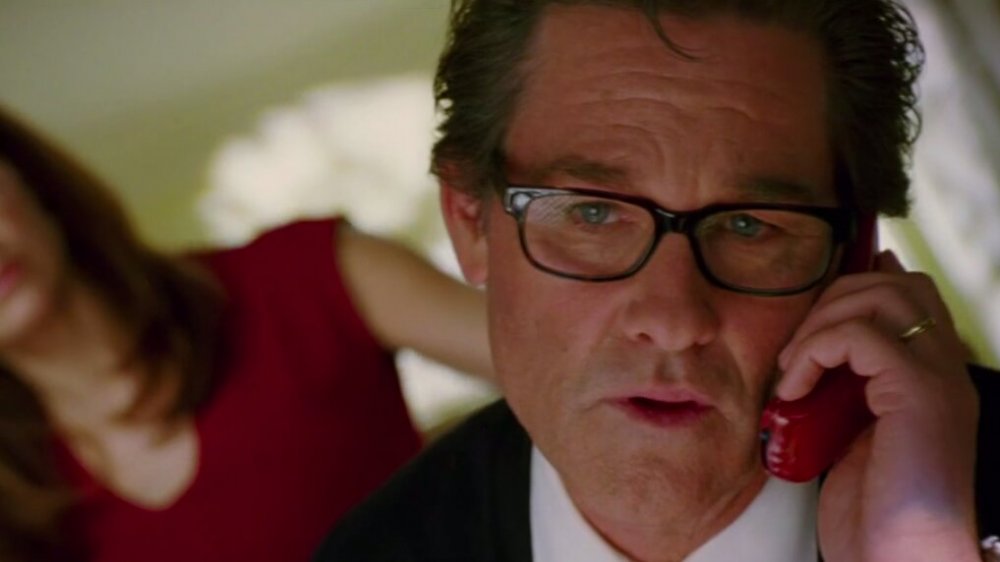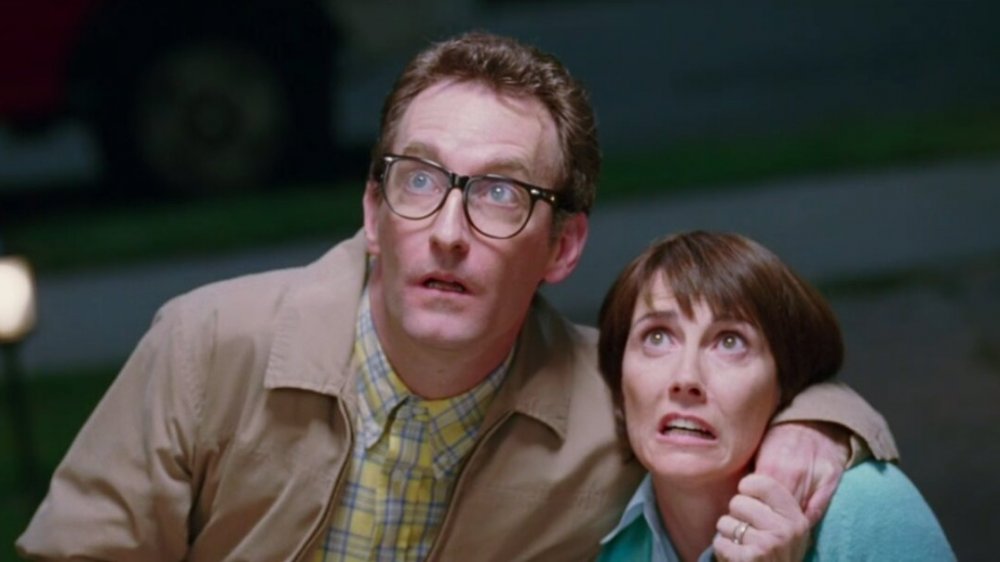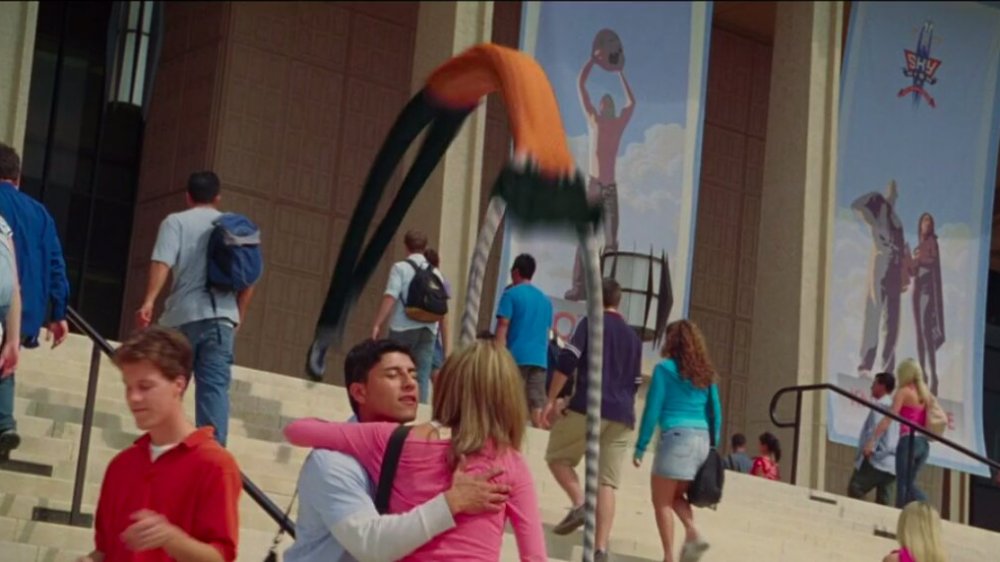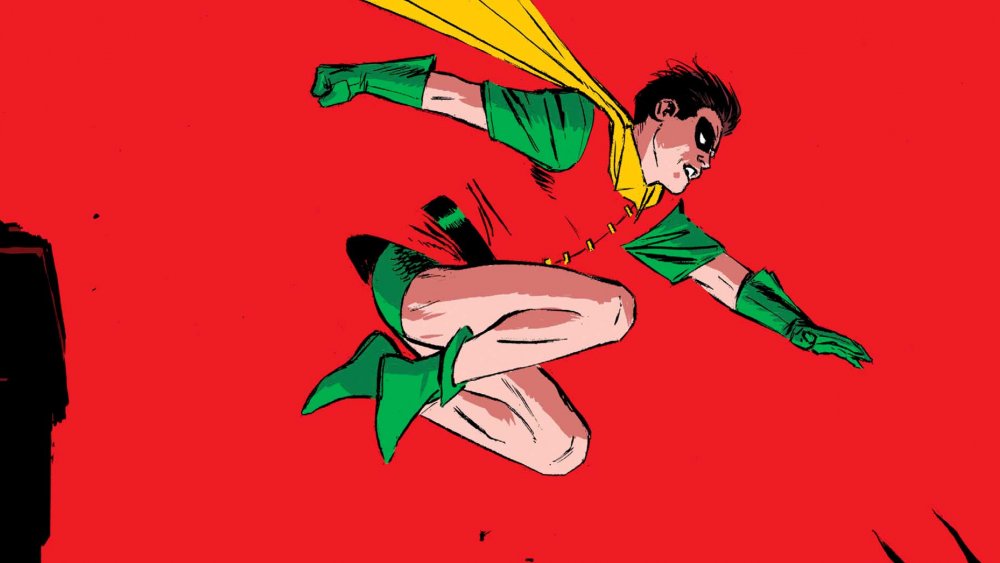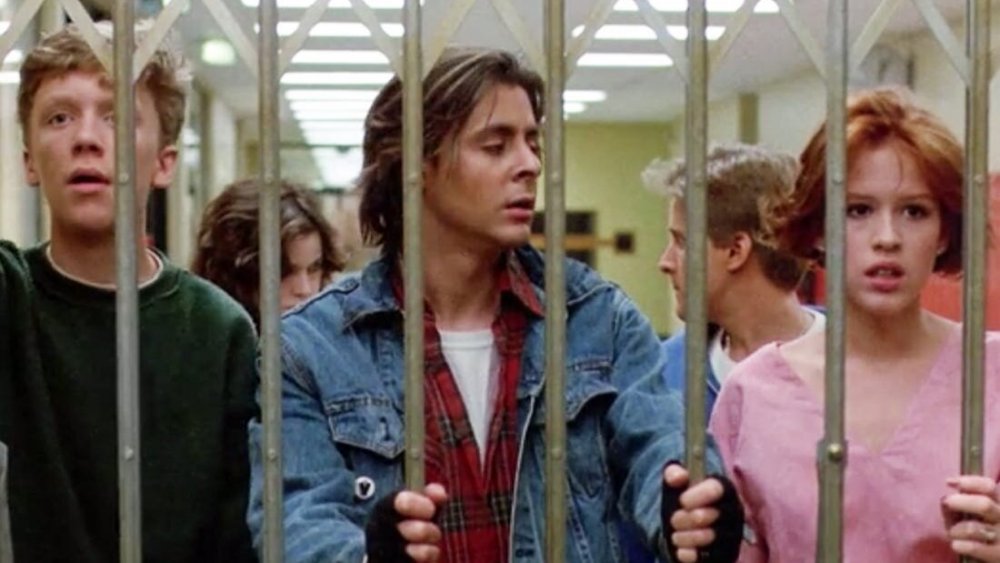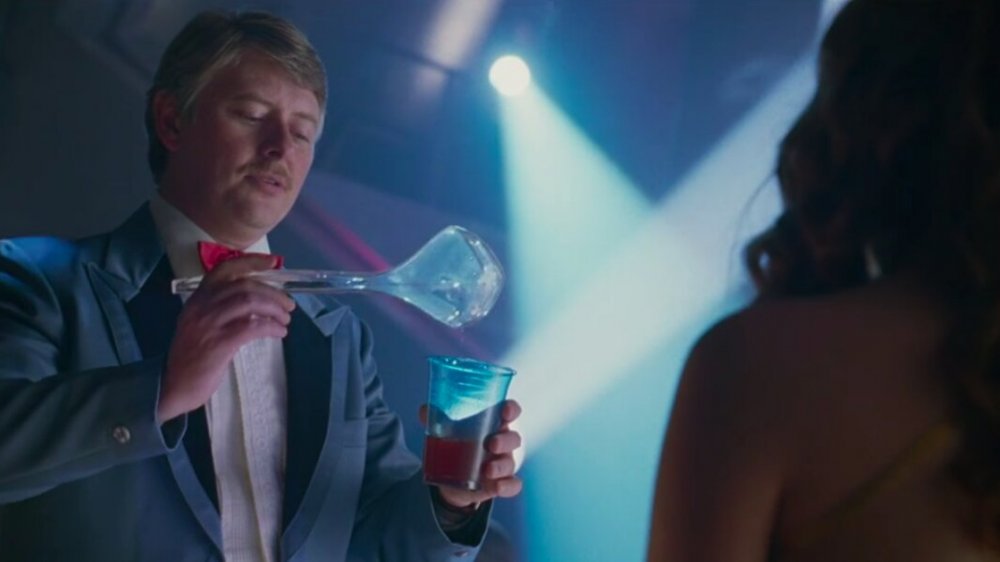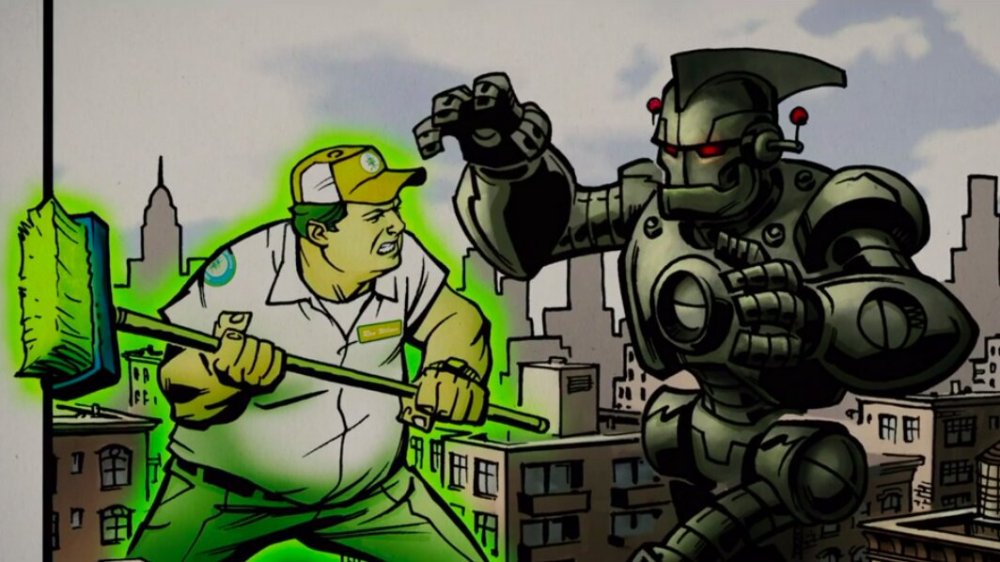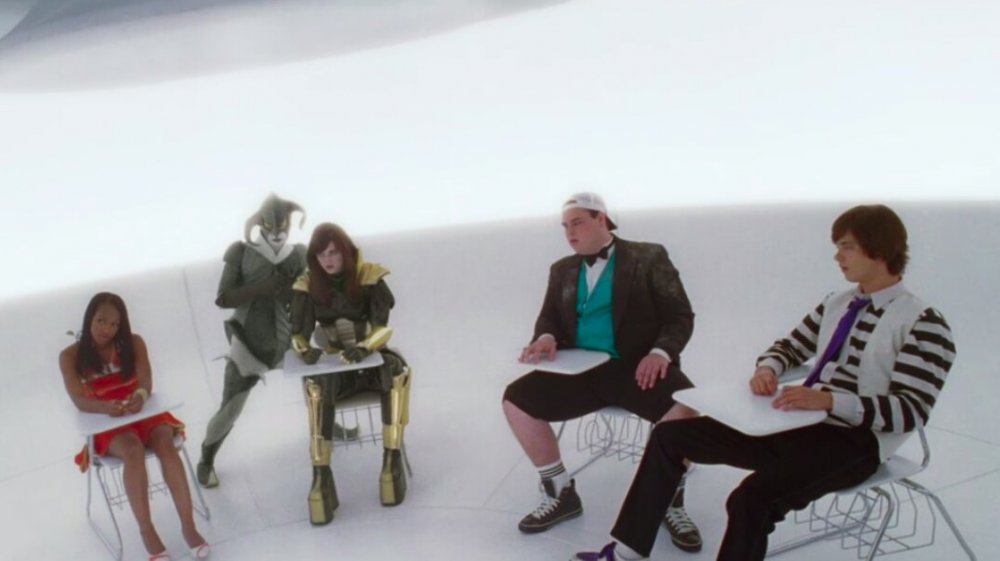Things Only Adults Notice In Sky High
2005's Sky High tells the story of a school for teen superheroes. Its witty, brightly-colored vision of future costumed crusaders battling crushes and class schedules is a true delight. If you watched it at the right age, you might have spent hours in your yard trying to bend blades of grass to your will, or perhaps attempting to pick up a sibling with your pinky finger. Sky High makes it all feel so possible, if only for a moment — who's to say you, a normal kid from a normal place, couldn't become a superpowered student too?
Though more than a decade has passed since its premiere, it's still worth anyone's time, and rewards rewatching specifically. In the white-hot flare of superhero movie dominance, Sky High is a gentle throwback to superheroes at their silliest, before most of knew what Infinity Stones and Sokovia Accords even were. Moreover, it's a whole heck of a lot of fun to revisit as an adult: Sky High contains a wealth of details, dialogue, and dynamics that fly over the younger heads in the audience. These are the things you missed as a kid watching Sky High — and all the reasons you should rewatch it as an adult.
Will's room decor
Will Stronghold, Sky High's protagonist, has multiple Tenacious D and the Pick of Destiny posters on his wall. This 2006 film focuses on the titular comedy duo, best known for being stoners and seeking the secrets of rock music — not exactly the kind of thing the kids watching the PG-rated Sky High would tend to notice. But that's not the only interesting bit of memorabilia in Will's room. He also has a poster of the Aquabats, a celebrated real-world superhero rock band, known best for their costumes and sense of fun. Not only does that put Will's tastes in line with the coolest nerds of the '90s, it works in-universe — perhaps the Aquabats are actually superheroes in the world of Sky High?
Beyond this, Will has sketches, a lot of space-themed window stickers and posters, and even a guitar leaning up against the wall, behind a weight training bench. At a normal high school, he probably would have been outright cool, with or without superpowers.
Layla's leather bag
Layla's pacifist attitude is a common theme throughout the movie. She even refuses to show off her plant-based powers, because doing so violates her principles: She thinks a person's powers should only be used when the situation demands it. Does she live up to this code? Well, not really. Layla uses her abilities to give her crush an apple and make a flower at a restaurant table wilt. You know, high-stakes moments of life and death.
So perhaps it's not surprising that she seems to be violating her own principles when she's seen sporting a leather bag. Not many kids notice Layla's bag, or the other inconsistencies in her philosophy, but adults cotton on quickly. Of course, adults also understand that the teenage years are the age at which one learns that principles are complicated. Layla's figuring out her own values, and how best to carry them out. Still, though — someone tell this girl about the wide world of faux-leather goods.
"I'm not Wonder Woman, you know!"
Does Principal Powers look familiar? Kids look at her and see any other grown-up, but adults will likely notice something familiar in her face. That's because she's played by the one and only Lynda Carter, who portrayed the titular heroine of the 1970s Wonder Woman TV series.
This nod was actually meant to be more overt, but copyright got in the way. Originally, the plan was for Principal Powers to sport a pair of gold bracelets, referencing Wonder Woman's legendary bullet-deflection accessories. Unfortunately, Warner Bros., the studio that owns DC Comics and therefore holds the copyright to Wonder Woman, objected. Thus, the bracelets were banished. As Sky High fans know, however, this doesn't mean there were no nods to Carter's Amazonian history in the film. "I'm not Wonder Woman, you know," she says at one point in the film — a throwaway line that every grown-up in the audience gets a chuckle out of. And hey: Did you know that Nurse Spex is played by Cloris Leachman, who played Wonder Woman's mother in the same show?
Superpowered politics
Sky High is, like any school, a learning institution full of teens forming their first political opinions. The nuance of this dynamic most likely escapes kids — but adults, who might remember their adolescent causes with a cringe, catch every single line. Take Magenta: When she learns about the hierarchical organization of students at the school, she comments, "Power placement? Sounds fascist." She might be a little dramatic, but she's not wrong — this school runs on the separation of kids on the hero track and those destined for "hero support," otherwise known as sidekick status. Power matters here in a foundational way. Speaking of "hero support," a running joke revolves around the debate over the term. "I believe the preferred term is 'hero support,'" Ethan notes at one point, a type of niggling any adult can recognize as reminiscent of many real-world debates.
In one scene, Josie and Steve discuss their upcoming call with the President regarding "supervillain infiltration of the IRS." There is perhaps no joke that flies higher over kids' heads than this one. Their parents get a good chuckle out of it, however — figuring out one's taxes can certainly feel like being ensnared in some supervillain's scheme.
One-liners galore
When Steve Stronghold, also known as the almighty Commander, finds out that his son has been assigned to the sidekicks group in Power Placement, he becomes livid and insists that "Boomer is on a power trip." This is one particularly great example of the wordplay and innuendo Sky High packs its runtime with. The term "power play" does literally refer to what Boomer is doing, in taking out his negativity on an innocent kid he has power over. But of course, his desire to engage in that power play has to do with actual superpowers as well. He was not able to use his sonic abilities to become an A-list hero, and so he takes his anger out on kids.
When it comes to more risqué jokes, Sky High mostly refrains. One notable exception comes when Stitches snickers to Royal Pain, "Smooth move on the joystick," and she gets offended. Even this innuendo, though, sounds more goofily high school than actually dirty. It's a slightly adult joke, but it's also just another piece of world-building, reinforcing the fact that this is high school, albeit with superpowers. The awkward transition of adolescence is, well, awkward, and it often entails a lot of really dumb jokes.
Career callbacks and idiomatic names
Sky High is jam-packed with character names that serve as puns and allusions to idioms and media few kids notice. At most, kids might catch the oxymoron in Warren Peace's name, but not know the classic work of literature it is based on. His name also refers to the conflicting nature of his parentage: His mother is a superhero, and his father is a villain. It's punny and it's thematically resonant! Then there's the fiendish Royal Pain. A "royal pain" is something that's infuriating beyond mere nuisance. Adults are more likely to know that phrase — and to be accustomed with the woes of life it signifies.
As far as references go, a line delivered by the Commander recalls another movie starring Kurt Russell: 1986's Big Trouble in Little China. After taking a distress call, he dramatically informs Jetstream that there is trouble downtown, then repeats himself. "Big trouble," he intones gravely, "downtown."
Spongebob and Karen
The cast of Sky High is chock-full of comedy and sci-fi stars. One of the most recognizable cameos is also uniquely invisible to most kids: Tom Kenny and Jill Talley, the voice of Spongebob Squarepants and Karen, Plankton's computerized wife, from the iconic Nickelodeon cartoon. The actors, who are married in real life, appear briefly as Mr. and Mrs. Timmerman. The pair have just purchased a home, a sale mentioned by Steve Stronghold earlier in the movie. As the floating school plummets toward them from above, they comment that they didn't need extra insurance, because the movers didn't break a thing. Little do they know, their entire home is about to be crushed.
Kids won't tie these actors to their animated characters, but adults, who might also be aware of Kenny and Talley's prolific careers beyond Spongebob, are a lot likelier to know who they are. They also grasp the irony of their characters' pride going before an all-too-literal fall. Kids, in contrast, can't comprehend the stress involved in budgeting and coordinating a move. But hey, one of the primary criteria for couples purchasing a home is proximity to good schools. After Sky High falls on top of their house, they certainly have that box checked.
Costumes with character
As any fashion magazine will tell you, vertical stripes are slimming. So it's funny that Lash, who has the power to stretch himself thin (literally), wears horizontal stripes instead. His sleeves are also reminiscent of a striped prison uniform, perhaps foreshadowing his eventual reveal as a villainous character.
Many characters' outfits are significant in similar ways. Take Gwen Grayson's pink color scheme. The most universally feminine color stands in stark contrast to the fact that her supervillain persona, Royal Pain, is always assumed to be male. Pink is also a bright color, one that stands out in the crowd. This stands in dramatic opposition to Sue Tenny, Gwen's original self, who blended into the background as a geek. Her superpowers were poorly understood at the time, resulting in alienation from her classmates. Pink, in other words, is the last color you'd associate with her — which makes her rebirth as Gwen, and her ultimate plan, all the more thoughtful and surprising.
Superheroic roots
Gwen Grayson isn't just a major part of Sky High — her name contains the movie's most overt homage to comic book history. Gwen Stacy, famous as Peter Parker's tragic girlfriend and, more recently, the indefatigable Spider-Gwen, and Dick Grayson, the original Robin (and eventual Nightwing) are the characters from which her name springs, and her role in the movie can also be interpreted as a hybrid of these two. Robin, the original sidekick, has often been the butt of cultural jokes: He's nonsensical if you're taking Batman seriously (don't take kids onto the battlefield, folks), wears a brightly colored costume, and is just generally goofy. Gwen's vengeance and villainy take root in the fact that she is unappreciated and misunderstood is a similar way. On the flip side, Gwen Stacy began as the ultimate dream girl for Spider-Man fans to idealize. When Gwen first appears, we see her bathed in a trope-y halo of light that signifies puppy love at first sight and the simplicity of comic book romance. Both she, and Marvel's Gwen, are more than they seem.
'80s influences
The soundtrack of Sky High is full of hits only adults will recognize. Cue the nostalgia! Tears for Fears' 1985 classic "Everybody Wants to Rule the World" starts the film off strong. Other hits include "Can't Stop the World" released by the Go-Gos in 1981, the Smiths' 1984 song "Please, Please, Please, Let Me Get What I Want," and "Just What I Needed" by the Cars (which technically came out in 1978).
This soundtrack represents the many cues Sky High takes from '80s media. Fans of The Breakfast Club, which came out in 1985, will recognize that core group of protagonists in Sky High's characters. Warren mirrors the brooding bad boy John Bender, Magenta calls back to the withdrawn Allison Reynolds, Zach, the goofy geek, reflects the character of Brian Johnson, Claire Standish is the principled and goody-two-shoes-ish Layla, and Will is characterized by the same defining athleticism as Andrew Clark. Another throwback comes from the sound effect played when Warren Peace attempts and fails to use his firepower in the power-proof detention room — a clicking Zippo lighter, just like Bender's.
"You look like you could use a drink!"
This line comes from Mr. Boy, the Hero Support teacher. He follows it up with this reassurance to Layla: "Don't worry, the bubbles are just ginger ale." As if a teacher would intentionally get a bunch of high schoolers drunk! Well, maybe Mr. Medulla would try it as part of a controlled science experiment, and spiking the punch definitely seems like something Lash or Speed would do. But give Sky High some credit — the school keeps the punch bowl safe for students.
Beyond earning a laugh from the adult audience, though, this moment also highlights the way the movie portrays its central children as more adept than the adults around them. Whether or not these dynamics are accurate as far as high school goes... well, that's ultimately up for debate. But grown-up viewers will remember the feeling of grasping things their parents didn't all too vividly.
The long legacy of caped crime-fighters
When All-American Boy comments on the importance of avoiding clashing color schemes between heroes and sidekicks, he's taking a light jab at Batman and Robin's garb. The movie is full of similar references to its source materials that only the most comics-savvy members of the audience will get. In the most explicit sense of the word, the movie is derivative, after all — but not in the negative way that the word usually implies. No, Sky High just literally derives its story from the long history of superhero comics, and is creative enough to craft its own relationship to the canon of the medium. Loving jokes about tropes are just one piece of that puzzle.
Sky High pokes particular fun at hero (and villain) origin stories, especially the difference in experience between those who are radioactively transformed and those who inherit powers from their parents. There is even a joke at the end that ties up the story of Ron Wilson, the bus driver, in a charmingly goofy jab at chemical-induced superpowers: He falls into a vat of toxic waste and starts battling giant robots. That's the dream! His push broom appears to have fallen into the vat of toxic waste with him, given the fact that it too is enormous and glowing. Wilson is an unlikely superhero, and that's the point — these stories are silly and unrealistic, and that's why we love them.
"I went through puberty twice for this?!"
Younger children might hear this line and ask their parents, "What's puberty? It sounds bad." With the comments throughout the movie about "late bloomers" who take a while to develop their powers, though, parents may have an out. They can say that puberty is the process of developing superpowers, like getting a low Batman voice or stronger muscles. Technically true! Though of course, those kids will eventually find out the truth the hard way.
That being said, as the movie's last line states, "That's just high school." Yeah, puberty sucks, but you also develop your own sense of style during it, find a group of friends, and learn to balance the desire to belong with the desire to be true to one's self. Most importantly, though, you learn that there is no pacifier, and you're on a bumpy flying bus ride to adulthood with no hope of returning to simpler times. But hey — we all get through it, just like Will does. Kids might not get the humor of this line, but the movie is helping prepare them for the age at which it'll eventually click.

